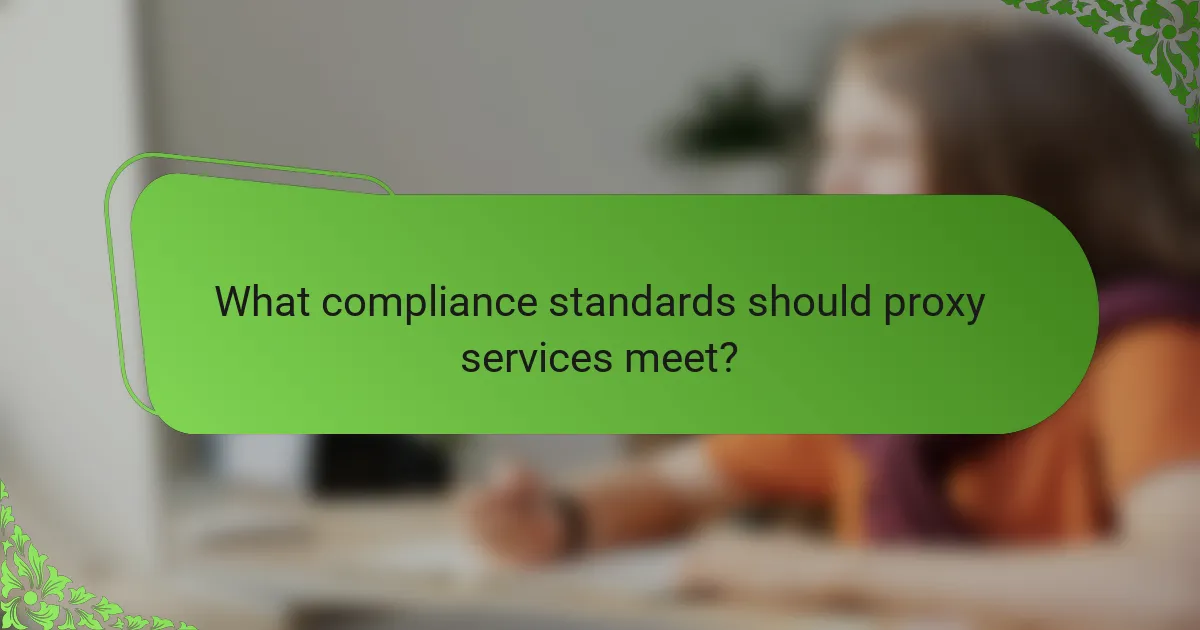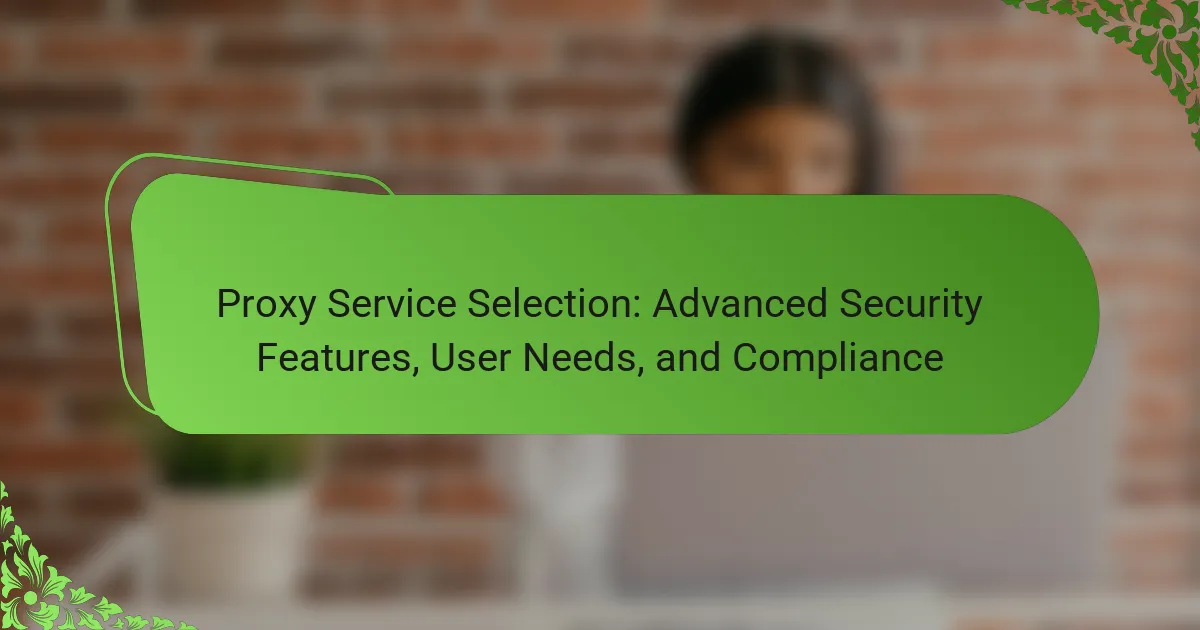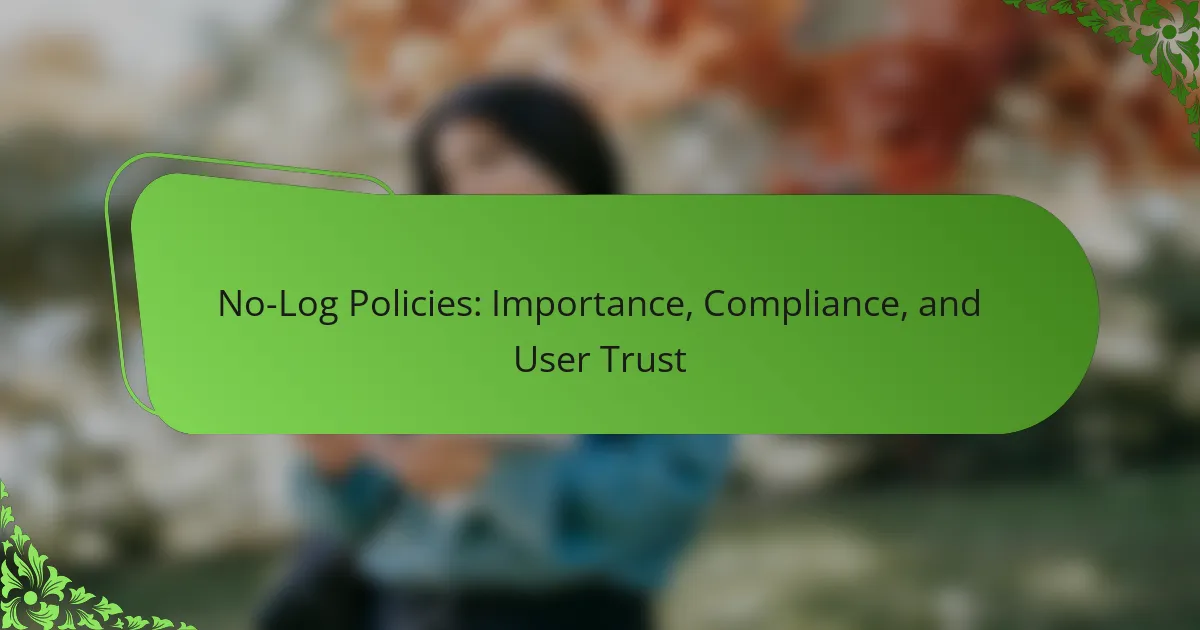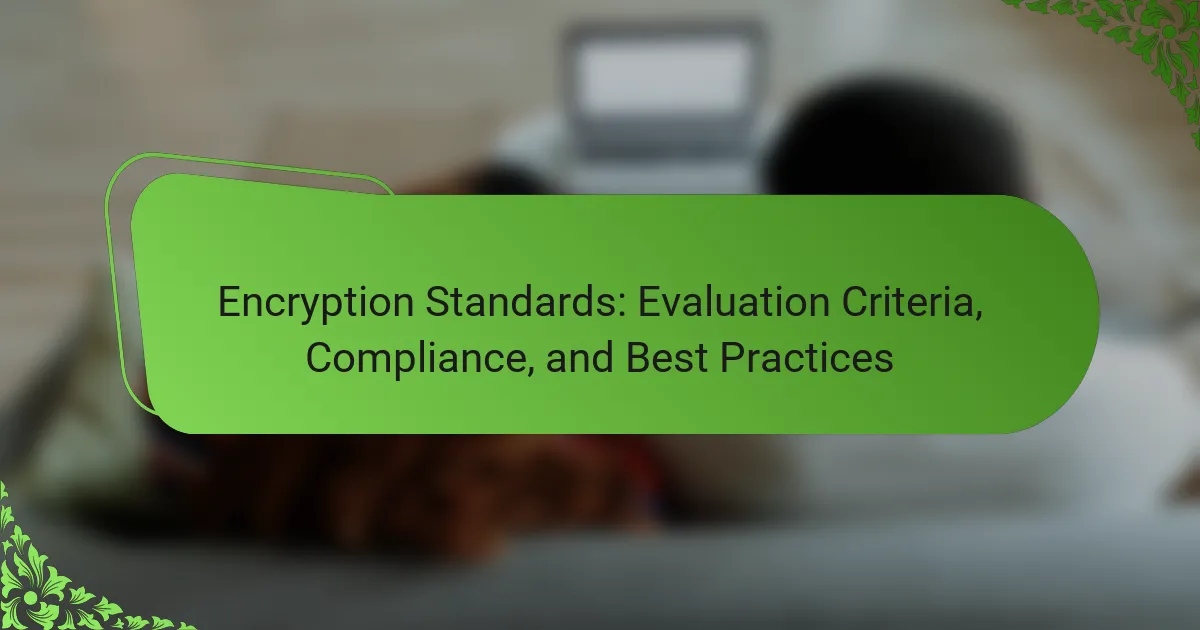Selecting the right proxy service is essential for enhancing online privacy and securing sensitive information. Key considerations include advanced security features such as encryption protocols and data leak protection, as well as understanding user needs related to bandwidth, geolocation, and device compatibility. Additionally, compliance with standards like GDPR and HIPAA is crucial for ensuring that data is handled responsibly and securely.

What advanced security features should I look for in a proxy service?
When selecting a proxy service, focus on advanced security features that enhance your online privacy and protect sensitive data. Key features to consider include encryption protocols, IP masking capabilities, multi-factor authentication, data leak protection, and firewall integration.
Encryption protocols
Encryption protocols are essential for safeguarding your data as it travels over the internet. Look for services that support strong protocols like OpenVPN, IKEv2, or WireGuard, which provide robust encryption standards to protect your information from eavesdroppers.
Ensure that the proxy service offers end-to-end encryption, which means that your data is encrypted from your device to the destination server. This is crucial for maintaining confidentiality, especially when accessing sensitive information.
IP masking capabilities
IP masking capabilities allow you to hide your real IP address, making it difficult for websites and services to track your online activities. A good proxy service should offer a range of IP addresses from different geographical locations, enabling you to bypass geo-restrictions and access content freely.
Consider whether the service provides rotating IP addresses, which change periodically to enhance anonymity. This feature is particularly useful for activities like web scraping or accessing region-specific content without revealing your identity.
Multi-factor authentication
Multi-factor authentication (MFA) adds an extra layer of security by requiring multiple forms of verification before granting access to your account. Look for proxy services that support MFA, such as SMS codes or authenticator apps, to protect your account from unauthorized access.
Implementing MFA significantly reduces the risk of account compromise, ensuring that even if your password is stolen, additional verification is needed to access your proxy service.
Data leak protection
Data leak protection features help prevent sensitive information from being inadvertently exposed during online activities. A reliable proxy service should include DNS leak protection and WebRTC leak protection to ensure that your real IP address remains hidden.
Check if the service offers automatic kill switches, which terminate your internet connection if the proxy fails, preventing any data leaks. This is particularly important when using public Wi-Fi networks, where security risks are higher.
Firewall integration
Firewall integration enhances the security of your proxy service by filtering incoming and outgoing traffic based on predetermined security rules. This feature helps block malicious traffic and unauthorized access attempts, providing an additional layer of protection.
When evaluating proxy services, consider those that offer customizable firewall settings, allowing you to tailor security measures to your specific needs. This flexibility can be crucial for businesses that require stringent security protocols to protect sensitive data.

How do user needs influence proxy service selection?
User needs play a critical role in selecting a proxy service, as they determine the features and capabilities that are most important for effective use. Understanding whether the proxy will be used for business or personal purposes, bandwidth requirements, geolocation preferences, and device compatibility helps users make informed decisions that align with their specific needs.
Business vs. personal use
The choice between a proxy for business or personal use significantly affects the selection process. Business proxies often require advanced security features, higher reliability, and the ability to handle multiple users simultaneously. In contrast, personal proxies may prioritize ease of use and cost-effectiveness, with fewer stringent requirements.
For businesses, features like dedicated IP addresses, enhanced encryption, and compliance with data protection regulations are crucial. Personal users might focus on speed and simplicity, opting for services that offer user-friendly interfaces and lower monthly fees.
Bandwidth requirements
Bandwidth needs vary widely based on the intended use of the proxy service. High-bandwidth applications, such as streaming or large file downloads, necessitate proxies that can support substantial data transfer without significant latency. Users should assess their typical usage patterns to determine the necessary bandwidth.
For instance, a business conducting video conferences may require a proxy that can handle high-speed connections, while a casual user browsing the web may find a lower bandwidth sufficient. It’s advisable to choose a service that offers scalable bandwidth options to accommodate future needs.
Geolocation preferences
Geolocation preferences are essential when selecting a proxy service, especially for users needing to access region-specific content. Different proxies can provide IP addresses from various countries, allowing users to bypass geographic restrictions on websites and services.
For example, a user in Europe wanting to access content available only in the United States would benefit from a proxy that offers U.S. IP addresses. It’s important to verify that the proxy service has a diverse range of locations to meet specific geolocation requirements.
Device compatibility
Device compatibility is a key consideration in proxy service selection, as users may access the internet from various devices, including desktops, laptops, smartphones, and tablets. A suitable proxy service should support multiple platforms to ensure seamless connectivity across all devices.
Before choosing a proxy, check if it is compatible with your operating system and devices. Some services offer browser extensions or mobile apps, which can enhance usability. Ensuring compatibility can prevent connectivity issues and improve the overall user experience.

What compliance standards should proxy services meet?
Proxy services should comply with various standards to ensure data protection, privacy, and security. Key compliance standards include GDPR, HIPAA, and PCI DSS, each addressing specific regulatory requirements that impact how data is handled and protected.
GDPR adherence
The General Data Protection Regulation (GDPR) is a critical standard for any proxy service operating in or serving clients in the European Union. It mandates strict guidelines on data processing, requiring services to ensure user consent, data minimization, and the right to access personal data.
To comply with GDPR, proxy services must implement robust data protection measures, such as encryption and anonymization, and maintain transparent data processing policies. Regular audits and risk assessments are also essential to demonstrate compliance and protect user privacy.
HIPAA compliance
The Health Insurance Portability and Accountability Act (HIPAA) applies to proxy services that handle protected health information (PHI) in the United States. Compliance requires implementing safeguards to ensure the confidentiality, integrity, and availability of PHI.
Proxy services must conduct risk analyses, establish access controls, and ensure that any data transmission is encrypted. Business Associate Agreements (BAAs) should also be in place with any third-party vendors to ensure they meet HIPAA standards.
PCI DSS requirements
The Payment Card Industry Data Security Standard (PCI DSS) is essential for proxy services that process credit card transactions. Compliance involves adhering to a set of security standards designed to protect cardholder data from theft and fraud.
To meet PCI DSS requirements, proxy services must implement strong access control measures, maintain a secure network, and regularly monitor and test networks. Additionally, they should ensure that sensitive data is encrypted during transmission and storage to mitigate risks associated with data breaches.

What are the pricing models for proxy services?
Proxy services typically offer various pricing models to cater to different user needs. The most common models include subscription plans, pay-as-you-go options, and free trials, each with distinct features and benefits.
Subscription plans
Subscription plans involve a recurring fee, usually billed monthly or annually, providing users with consistent access to proxy services. These plans often come with tiered pricing based on the number of proxies, bandwidth limits, or additional features like enhanced security.
For example, a basic plan might cost around $10 to $30 per month, while premium plans with advanced features can range from $50 to $150 monthly. Users should assess their needs and choose a plan that aligns with their usage patterns to avoid overpaying.
Pay-as-you-go options
Pay-as-you-go options allow users to pay only for the resources they consume, making this model flexible and cost-effective for sporadic use. Charges are typically based on data usage or the number of requests made through the proxy.
This model can be ideal for businesses that require proxies for short-term projects or testing, as costs can vary widely, often falling between $0.01 to $0.10 per request. Users should monitor their usage to prevent unexpected charges.
Free trial availability
Many proxy service providers offer free trials, allowing potential customers to test the service before committing to a paid plan. These trials usually last from a few days to a couple of weeks and provide access to a limited number of features.
Taking advantage of free trials can help users evaluate performance, reliability, and customer support. However, it’s essential to read the terms carefully, as some trials may require credit card information and automatically convert to paid plans if not canceled in time.

How do I evaluate the performance of a proxy service?
To evaluate the performance of a proxy service, focus on key metrics such as connection speeds, uptime guarantees, and latency measurements. These factors will help you determine how well the service meets your needs and expectations.
Connection speeds
Connection speed is a critical factor when assessing a proxy service, as it directly affects how quickly you can access content. Look for services that offer high-speed connections, ideally in the range of several hundred Mbps for optimal performance.
When testing connection speeds, consider conducting multiple tests at different times of the day to account for variations in network traffic. A reliable proxy service should consistently deliver fast speeds, with minimal fluctuations.
Uptime guarantees
Uptime guarantees indicate the reliability of a proxy service. Look for providers that offer at least 99% uptime, which translates to minimal downtime and uninterrupted access to the internet.
Check the provider’s service level agreement (SLA) for specific uptime commitments and compensation policies in case of outages. A strong uptime guarantee is essential for businesses that rely on constant connectivity.
Latency measurements
Latency refers to the delay before data begins to transfer after a request is made. For proxy services, low latency is crucial, ideally in the low tens of milliseconds range, to ensure a smooth browsing experience.
To measure latency, use tools that can ping the proxy server and report response times. Consistently low latency values indicate a well-optimized proxy service, while high latency can lead to frustrating delays in accessing content.

What are the top proxy services available in North America?
The top proxy services in North America include well-known providers like Bright Data, Smartproxy, and Oxylabs. These services offer a range of features tailored to various user needs, including advanced security, speed, and compliance with local regulations.
Advanced Security Features
Advanced security features in proxy services are crucial for protecting user data and maintaining anonymity. Look for services that offer encryption, IP rotation, and secure authentication methods. These features help mitigate risks such as data breaches and unauthorized access.
For instance, a service that provides HTTPS encryption ensures that your data is secure during transmission. Additionally, IP rotation can prevent tracking by frequently changing the IP address, enhancing privacy. Always check if the service complies with industry standards like GDPR or CCPA for added assurance.
User Needs
Understanding user needs is essential when selecting a proxy service. Different users may prioritize speed, reliability, or specific functionalities such as web scraping or bypassing geo-restrictions. Identifying your primary requirements will help narrow down the options.
For example, if you need a proxy for web scraping, choose a service that offers a large pool of residential IPs to avoid detection. Conversely, if your focus is on streaming content, look for services that guarantee high-speed connections and minimal latency.
Compliance
Compliance with local laws and regulations is vital when using proxy services in North America. Ensure that the provider adheres to relevant legal frameworks, such as the CCPA in California, which governs data privacy and consumer rights.
Before selecting a service, review their privacy policy and terms of service to confirm their compliance practices. This will help you avoid potential legal issues and ensure that your data is handled responsibly. Always choose providers that are transparent about their data handling and user privacy commitments.










